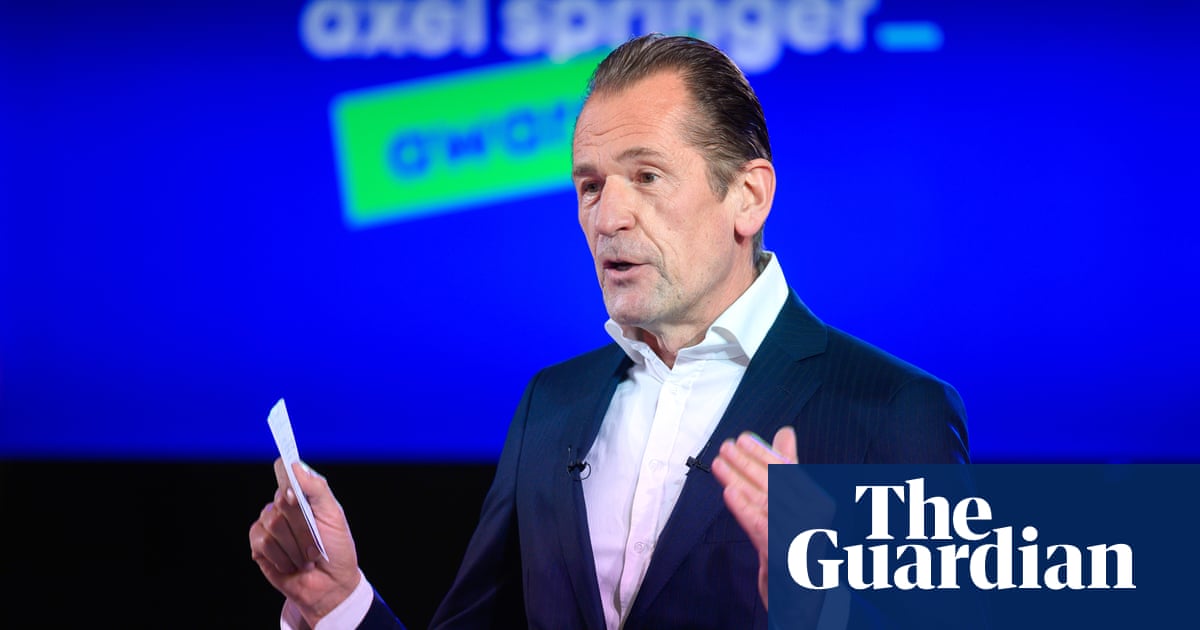
The German CEO of Europe’s largest media publisher tried to use his flagship tabloid, Bild, to influence the outcome of Germany’s last election and fed the newspaper his personal views attacking climate change activism, Covid measures and the former chancellor Angela Merkel, leaked messages suggest.
The internal chats, emails and text messages published by the German weekly Die Zeit on Wednesday clash with the public presentation of Axel Springer SE’s chief executive, Mathias Döpfner, who recently said he wanted to bring “non-partisan” journalism to a too-polarised US media landscape through his acquisition of the English-language title Politico.
In one of the messages quoted verbatim in Die Zeit, from 2017, Döpfner says: “I am all for climate change,” seemingly arguing that human civilisation in periods of warm climate was always “more successful” than during cold-climate periods. “We shouldn’t fight climate change but adjust to it.”
The comments are part of a longer message in which Döpfner sums up his foreign policy views as “Free west, fuck the intolerant Muslims and all the other riff-raff.”
Döpfner, who holds a 22% share in the Berlin-based company Axel Springer and sits on the board of directors of Netflix, repeatedly voiced his distrust of the population of the formerly socialist states of eastern Germany. “The ossis [east Germans] are either communists or fascists. They don’t do in-between. Disgusting.”
In a message from October 2019, the top executive ponders writing an article on the 30th anniversary of the fall of the Berlin Wall in which he calls for rescinding reunification and turning the former GDR into an “agrarian and production zone with uniform wage payments”. “My mother always said it. The ossis are never going to be democrats.”
In a statement uploaded to Axel Springer’s internal message board on Thursday and seen by the Guardian, Döpfner said: “Articles of mine published over four decades show the way I think. I let myself be taken to account for every published word. But out-of-context fragments of texts and conservations cannot be held up as my ‘true way of thinking’.”
Referencing the passages on climate change, east Germany and Islam, Döpfner said he believed that “climate change is real and threatening” but that he reserved the right to make fun of some of the reactions to the subject. He said he held “no prejudices” against east Germans or Muslims, but he was concerned about the success of the far right in the east and radical Islam.
In its report, Die Zeit said Döpfner’s personal dislike of the GDR-raised ex-chancellor Merkel had put Döpfner on a collision course with Friede Springer, the widow of the company founder Axel and its majority shareholder.
While Friede Springer wrote to Bild’s then editor, Julian Reichelt, at the start of the pandemic in 2020 to praise Merkel’s leadership, Döpfner railed against pandemic restrictions brought in by the then chancellor.
“That is the end of the market economy,” he wrote after the German parliament passed a historic aid package to shield the economy from coronavirus-related shocks. “And the beginning of 33,” Döpfner added, seemingly a reference to the year Adolf Hitler was appointed chancellor and turned Germany into a dictatorship.
Messages quoted by Die Zeit also show the publishing executive enthusiastic in his praise for Donald Trump after the January 2020 killing of the Iranian general Qassem Suleimani by an American drone strike. “My suggestion. Nobel peace prize for Trump,” one message reads. “And take it away from ibama [sic].” Barack Obama was given the Nobel peace prize in 2009.
The publication of the leaked messages comes a year and a half after Döpfner cut ties with the editor of Bild over allegations of sexual misconduct. At the time, the executive presented the issue as a “culture problem” specific to the notoriously pugilistic rightwing tabloid, unconnected to the modern publishing empire.
Last September, Döpfner told the Washington Post that through his acquisition of Politico he wanted to “prove that being nonpartisan is actually the more successful positioning”, describing that approach as his “biggest and most contrarian bet”.
In Germany, the publication of the leaked texts has sent shock waves through the country’s political circles, not least because Döpfner has long successfully presented himself as something more akin to a public intellectual than a business manager.
While his standing as a respectable figure was shaken by the scandal around Julian Reichelt, Döpfner’s former protege at Bild, the fallout was limited. In June last year, Döpfner stepped down as president of the Federation of German Newspaper Publishers.
The leaked messages also raise specific questions about close links between the Springer publishing empire – whose flagship titles includes Bild, Die Welt, Business Insider and Politico – and the pro-business Free Democratic party (FDP), a junior partner in Olaf Scholz’s three-party coalition government.
Citing a dinner with the FDP leader, Christian Lindner, Döpfner repeatedly urged Reichelt as Bild editor to “do more for the FDP” in the run-up to the September 2021 federal elections. “Please strengthen the FDP,” he wrote two days before the vote. “If they do well they can act with such authority in the traffic light [coalition of Social Democrats, Green party and FDP] that it collapses.”
Such a collapse, the message intimates, would bring about his preferred outcome of a conservative-led so-called “Jamaica” coalition between Christian Democrats, Greens and FDP.
In his statement issued on Thursday afternoon, Döpfner responded to the allegation that he used Bild as a tool to further his own political interests.
“In the spirit of freedom and variety of speech I enjoy having arguments – especially with our editors, who are all responsible and self-confident,” he said. “That also explicitly applies to alleged influence taken in regards to the FDP. I am very close to the values of this party. But thank God our journalists won’t let themselves be influenced.”
Reichelt has not responded to German media requests on the leaked messages.
Die Zeit cited Reichelt’s lawyer questioning the legality of the disciplinary procedure that led to his ousting and announcing his intention to take legal steps against Axel Springer in Germany and the US.












